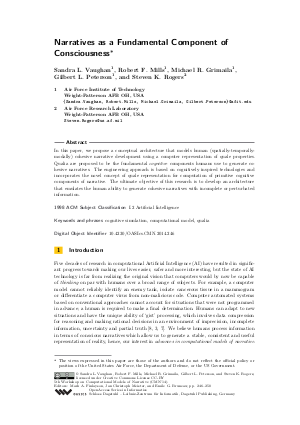Narratives as a Fundamental Component of Consciousness
Authors Sandra L. Vaughan, Robert F. Mills, Michael R. Grimaila, Gilbert L. Peterson, Steven K. Rogers
-
Part of:
Volume:
2014 Workshop on Computational Models of Narrative (CMN 2014)
Part of: Series: Open Access Series in Informatics (OASIcs) - License:
 Creative Commons Attribution 3.0 Unported license
Creative Commons Attribution 3.0 Unported license
- Publication Date: 2014-08-08
File

PDF
OASIcs.CMN.2014.246.pdf
- Filesize: 0.93 MB
- 5 pages
Document Identifiers
Subject Classification
Keywords
- cognitive simulation
- computational model
- qualia
Metrics
- Access Statistics
-
Total Accesses (updated on a weekly basis)
0Document
0Metadata
Abstract
In this paper, we propose a conceptual architecture that models human (spatially-temporally-modally) cohesive narrative development using a computer representation of quale properties. Qualia are proposed to be the fundamental "cognitive" components humans use to generate cohesive narratives. The engineering approach is based on cognitively inspired technologies and incorporates the novel concept of quale representation for computation of primitive cognitive components of narrative. The ultimate objective of this research is to develop an architecture that emulates the human ability to generate cohesive narratives with incomplete or perturbated information.
Cite As Get BibTex
Sandra L. Vaughan, Robert F. Mills, Michael R. Grimaila, Gilbert L. Peterson, and Steven K. Rogers. Narratives as a Fundamental Component of Consciousness. In 2014 Workshop on Computational Models of Narrative. Open Access Series in Informatics (OASIcs), Volume 41, pp. 246-250, Schloss Dagstuhl – Leibniz-Zentrum für Informatik (2014)
https://doi.org/10.4230/OASIcs.CMN.2014.246
BibTex
@InProceedings{vaughan_et_al:OASIcs.CMN.2014.246,
author = {Vaughan, Sandra L. and Mills, Robert F. and Grimaila, Michael R. and Peterson, Gilbert L. and Rogers, Steven K.},
title = {{Narratives as a Fundamental Component of Consciousness}},
booktitle = {2014 Workshop on Computational Models of Narrative},
pages = {246--250},
series = {Open Access Series in Informatics (OASIcs)},
ISBN = {978-3-939897-71-2},
ISSN = {2190-6807},
year = {2014},
volume = {41},
editor = {Finlayson, Mark A. and Meister, Jan Christoph and Bruneau, Emile G.},
publisher = {Schloss Dagstuhl -- Leibniz-Zentrum f{\"u}r Informatik},
address = {Dagstuhl, Germany},
URL = {https://drops.dagstuhl.de/entities/document/10.4230/OASIcs.CMN.2014.246},
URN = {urn:nbn:de:0030-drops-46612},
doi = {10.4230/OASIcs.CMN.2014.246},
annote = {Keywords: cognitive simulation, computational model, qualia}
}
Author Details
References
-
Alok Baikadi and Rogelio E. Cardona-Rivera. Towards finding the fundamental unit of narrative: A proposal for the narreme. In The Third Workshop on Computational Models of Narrative, pages 44-46, 2012.

-
Moshe Bar and Maital Neta. The proactive brain: Using rudimentary information to make predictive judgments. Journal of Consumer Behaviour, 7(4-5):319-330, 2008.

-
Christopher Williams Cowell. Minds, Machines and Qualia: A Theory of Consciousness. PhD thesis, University of California, 2001.

-
Othalia Larue, Pierre Poirier, and Roger Nkambou. A cognitive architecture based on cognitive/neurological dual-system theories, pages 288-299. Brain Informatics. Springer, 2012.

-
Othalia Larue, Pierre Poirier, and Roger Nkambou. A multi scale cognitive architecture to account for the adaptive and reflective nature of behaviour. In Web Intelligence and Intelligent Agent Technology (WI-IAT), 2012 IEEE/WIC/ACM International Conferences on, volume 2, pages 409-416. IEEE, 2012.

-
Hugo Liu and Push Singh. Conceptnet—a practical commonsense reasoning tool-kit. BT technology journal, 22(4):211-226, 2004.

-
Steven K. Rogers, Matthew Kabrisky, Kenneth W. Bauer, and Mark E. Oxley. Computing machinery and intelligence amplification. Computational Intelligence, The Experts Speak (Chapter 3), 2003.

-
Steven K. Rogers, Charles Sadowski, Kenneth W. Bauer, Mark E. Oxley, Matthew Kabrisky, Adam Rogers, and Stephen D. Mott. The life and death of atr/sensor fusion and the hope for resurrection. Automatic Target Recognition XVIII, 6967, 2008.

-
Timothy J. Ross. Fuzzy logic with engineering applications. John Wiley &Sons, 3rd edition, 2010.

-
Roger C. Schank. Dynamic memory: A theory of learning in people and computers. Cambridge: Cambridge University Press, 1982.

-
Robert Speer and Catherine Havasi. Representing general relational knowledge in conceptnet 5. In Proceedings of the Eight International Conference on Language Resources and Evaluation (LREC'12), pages 23-25. European Language Resources Association (ELRA), 2012.

-
Keith E. Stanovich. What intelligence tests miss: The psychology of rational thought. Yale University Press, 2009.

-
Keith E. Stanovich and Jonathan St. B. T. Evans. Dual-process theories of higher cognition advancing the debate. Perspectives on Psychological Science May 2013 vol. 8 no. 3 223-241, 8(3):223-241, 2013.

-
Ian Watson. Applying case-based reasoning: techniques for enterprise systems. Morgan Kaufmann Publishers Inc., 1998.

-
Ian Watson. Case-based reasoning is a methodology not a technology. Knowledge-Based Systems, 12(5):303-308, 1999.

-
Lotfi A Zadeh. Computing with words: Principal concepts and ideas. Springer Publishing Company, Incorporated, 2012.

